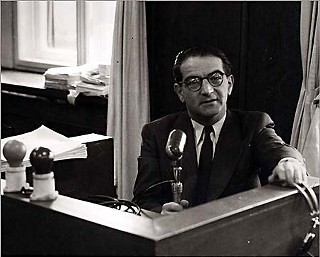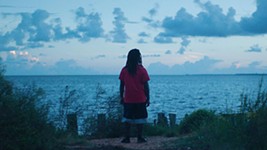A Legacy on Trial
AFS Documentary Tour: 'Killing Kasztner'
By Anne S. Lewis, Fri., Sept. 10, 2010
Filmmaker Gaylen Ross had her work cut out for her in Killing Kasztner. Rudolph Kasztner was a Hungarian Jew active in the rescue of Jewish refugees from the Nazis who was known as the Jewish Schindler for the "blood for goods" deal he cut with Adolf Eichmann that saved a trainload of 1,684 Hungarian Jews and potentially thousands more. After the war, living in Israel and working in the government, Kasztner was accused by a right-wing political opponent who'd lost family in the Holocaust of having collaborated with the Nazis simply by negotiating with them, and, as part of the deal to save the 1,684 (which included some of his own family and friends), of agreeing not to warn Hungary's Jews about Auschwitz. He was also accused of having vouched, after the war, for the character of some of the Nazis he'd dealt with.
Kasztner sued for libel but, after a protracted two-year trial, lost. He and his family were subsequently disgraced in their adopted homeland and snubbed by Holocaust memorials. Later, the court's judgment would be mostly reversed, but not before Kasztner was assassinated by a right-wing extremist.
That's the Reader's Digest version of the story.
If that were all there was to Kasztner's story, it wouldn't have taken Ross eight years to film or two hours to tell. Not that you'll be bored – the film is riveting. It's just that there's quite a bit of subtext – a toxic brew of clashing political, historical, and personal agendas stemming from the early years of Israel's statehood – that bears upon the issues litigated at Kasztner's trial, which devolved into nothing short of an existential exegesis. At issue: what the Jewish response to the Nazi genocide ought to have been. To the Jews living in Palestine pre-Israeli statehood, the European, or Diaspora, Jews had gone like "sheep to slaughter" when they ought to have resisted. And Kasztner's pragmatic decision to negotiate with the enemy was the amoral equivalent of collaboration. Remarkably, contempt was heaped on the immigrant Holocaust survivors, who were already reeling from their own horrors, compounded by their guilt over surviving while others perished. Kasztner's trial turned into a proxy for all of these issues, at the heart of which lurked the question about what constitutes a hero.
Ross was tasked with deciding how many strands of this complex story her film could do justice to. She took on quite a few and then some, including a plunge into the emotional terrain of the Kasztner family and the lingering effects his murder and shunning had on his legacy. Kasztner's assassin is a major talking head in the film. He goes on at extremely great length about everything from how he feels about what he did to who put him up to it (who were they, really?), until finally, we watch him handle an awkward meeting with the daughter and granddaughters of the man he shot – that is, assuming it actually was his bullet, and that's a big "if."
Like I said, it's complicated.
Austin Chronicle: How did you get interested in Kasztner?
Gaylen Ross: I first heard about the Kasztner story when I was producing a film on the Swiss banks and the Holocaust, and, during an interview, a woman told me how she had come to Switzerland as part of the Kasztner transport. In any case, after the Swiss film was completed, this story of the train remained with me, and I started to investigate it. On the Internet, I read terrible things about Kasztner, all sorts of accusations and allegations, written from the extreme left and right, from Zionists and anti-Zionists, from the religious and secular world. There were few in America defending Kasztner (very few even knew about this man and the rescue) except professor Egon Mayer, who made an avocation of researching and documenting what Kasztner did and balancing the historians' views. He was a sociologist devoted to this pursuit because his mother was pregnant with him during this rescue. I started to consult with professor Mayer and then expanded my work to include many historians, mostly in Israel, where the Kasztner drama led me – where Kasztner's family lived, many of the survivors, his accusers, and, of course, his assassin.
AC:Which aspect of your film are you the most pleased with?
GR:I'm most pleased with what has been for some the most difficult aspect of the film – the interweaving of past and present and characters in a kind of Rashomon style. The edit took two years, and it is a carefully constructed and considered mosaic.There have been critics who have praised this enormously, and others who didn't understand the style. It was my way of saying that this is not a "past-tense" drama, but one very much taking place in the present – the family's and survivors' rehabilitation of Kasztner's legacy, the emotional and ethical issues that characterize and continue to fascinate to this day – how do we conceive our heroes and the role of negotiation? Profound choices of life and death when there are no choices to be made?
AC: After making the film, did you come away with a different opinion about the Kasztner story?
GR:I came to the story with questions, not assumptions about Kasztner: Why isn't this incredibly dramatic tale of rescue part of Holocaust history? Why isn't Kasztner admired and honored the way Schindler is? What is the truth, and what are lies? What I didn't expect to find when I began filming were the considerable and powerful political and historical forces which conspired against Kasztner's legacy and the difficulty in undoing the damage once it was done.
AC: What has the reaction to the film been?
GR: The reaction to the film has been astounding. ... I was most surprised perhaps by two things – its amazing reception in Israel, especially [for] a film about their country directed and written by a non-Israeli. And, because this is still such a contentious and controversial subject there, that it received critical praise from all quarters – from both what one would call "right-" and "left-wing" press.
AC: Which of the Kasztner controversies do you feel your film resolves?
GR: Many of the charges against Kasztner were simply untrue and are refuted directly in the film: that only rich people were rescued (only 150 of the 1,684 paid, and they paid the ransom for everyone else) or that he only saved his family (only 19 of them were on the train, a hundred others perished in Auschwitz). However, the question as to why postwar Kasztner gave affidavits for several former Nazi officers was never satisfactorily resolved for me. Some have said Kasztner was blackmailed, others that he had made a "gentleman's agreement" for their help in saving Jews at the end of the war. The answer, however, that made sense to me came from historical researcher Shoshana Barri ... who makes a strong and credible case that Kasztner gave those testimonies on behalf of the Jewish leadership in Palestine in exchange for what those Germans could provide the new state of Israel, including help with the whereabouts of Eichmann. Her conclusions mean that Kasztner became a true scapegoat in this very tragic and difficult postwar era.
AFS Documentary Tour presents Killing Kasztner Wednesday, Sept. 15, 7pm, at the Alamo Drafthouse at the Ritz (320 E. Sixth). Tickets are $4 for Austin Film Society members and students with a valid ID and $6 for all others. Director Gaylen Ross will conduct a post-film Q&A. For more info, visit www.austinfilm.org.
[Editor's note: This feature has been edited slightly from the print version.]











